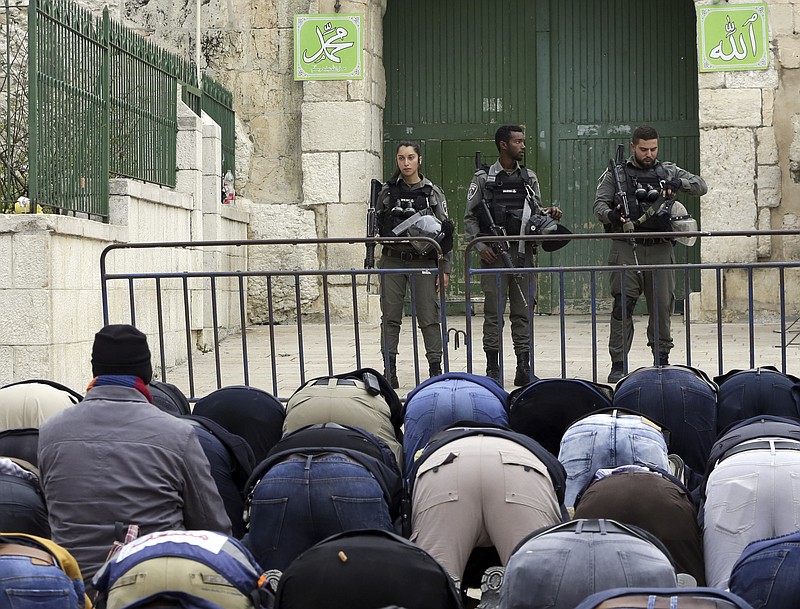JERUSALEM (AP) — Israeli police closed the entrances to Jerusalem’s most sensitive holy site Tuesday after Palestinian suspects threw a firebomb at a police station. The rare move drew angry reactions across the Muslim world.
Police later announced the site, which Jews call the Temple Mount and Muslims the Noble Sanctuary, would reopen to worshipers and visitors Wednesday morning.
There were no injuries reported from the firebombing. However, police quickly deployed across the hilltop compound, scuffling with Palestinians in the area, as they searched for the assailants. Two Palestinian minors were arrested and police were seen shoving and wrestling several people to the ground.
The incident further heightened tensions at the flashpoint site, home to the Al-Aqsa Mosque and gold-topped Dome of the Rock.
After the incident, Israeli police sealed off entrances to the compound. Police also restricted entrance to the Old City, home to Jerusalem’s most important religious sites, allowing only residents to pass through certain entrances to the Muslim and Christian quarters. Other entrances to the Old City remained open.
Firas Dibs, spokesman for the Waqf, the Jordanian-appointed Islamic body that administers the site, said police had cleared nearly all worshipers from the compound. “All doors are closed and no one is allowed in,” he said.
Several dozen worshipers gathered just outside the compound for impromptu prayers as Israeli police stood watch.
Police confirmed two arrests, while Dibs said six people had been arrested and 10 others injured in scuffles with police.
The U.N. Mideast envoy, Nickolay Mladenov, urged both sides to “respect the status quo” at the holy esplanade and exercise restraint “to avoid inflaming an already tense situation.”
Palestinian President Mahmoud Abbas denounced the “dangerous Israeli escalation” and warned of “serious repercussions.” In a statement, he called on the international community to intervene.
The closure of the sacred compound also drew censure from Jordan, the custodian of Muslim holy sites in Jerusalem. Abdul Nasser Abu Basal, Jordanian Minister of Islamic Affairs and Holy Sites, described the barring of Muslim worshipers from the site as “a flagrant assault on all religious values, rights and freedom,” and “an attack on all Muslims that touches the entire Islamic nation.”
Turkish Foreign Minister Mevlut Cavusoglu lashed out at Israel over the incident, saying it was time to end the country’s “recklessness.”
“We cannot accept such reckless attacks on holy sites and the whole world needs to react against it,” the Turkish state-run Anadolu Agency quoted Cavusoglu as saying.
The holy site has experienced a series of tense standoffs in recent weeks after Muslim worshipers reopened an area known as the “Gate of Mercy,” closed by Israel in 2003.
The Waqf has staged periodic prayer-protests inside since late February to call for unrestricted access to the shuttered building.
Israel closed the structure in 2003, claiming it was used by a heritage organization with ties to the Hamas militant group.
The Waqf contends that because the heritage group is now defunct, the council should regain full access to the building like any other in the holy esplanade.
Demonstrations have devolved into standoffs with police in recent weeks. Israel has barred several guards and high-ranking officials from the Waqf, the Jordanian religious authority that administers the site, from the compound and arrested dozens of Palestinians under suspicions of inciting violence at the site.
Officials in Jordan have confirmed they are in negotiations with Israel to resolve the dispute. Abbas’ office said the Palestinians also were in touch with various sides, including Jordan.

